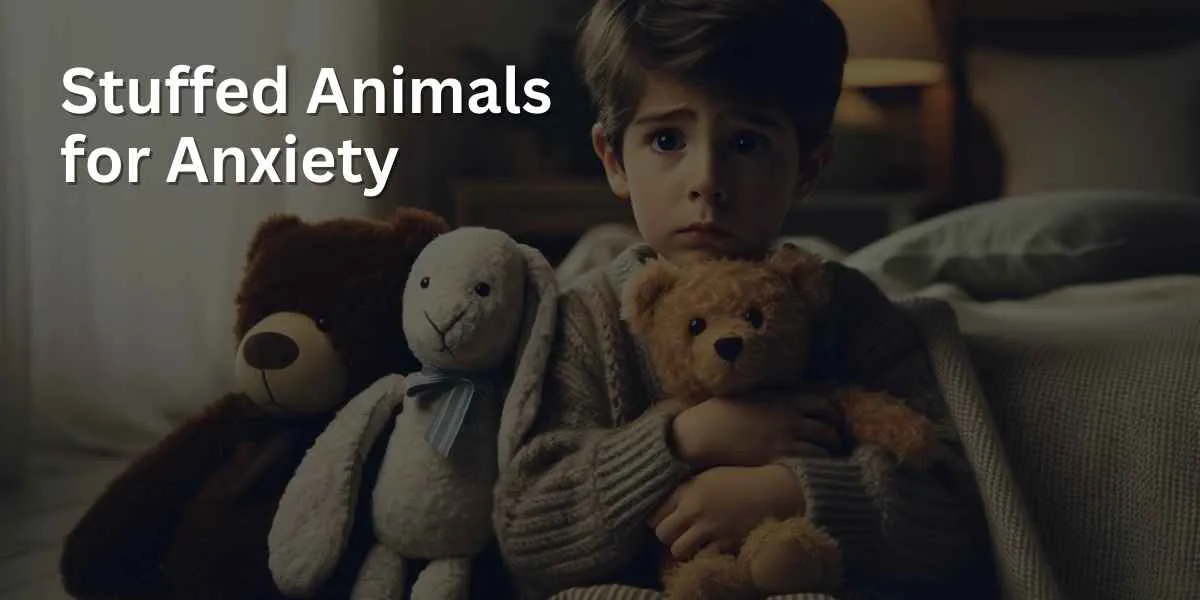Are you on the lookout for a cuddly companion that not only brings a smile to your child’s face but also helps ease those pesky feelings of anxiety?
Well, look no further! In this article, we’ll explore the wonderful world of stuffed animals and their incredible powers to bring comfort and calm into our lives. We promise that by the end of this read, you’ll be convinced that a fluffy friend is just what the doctor ordered for tackling stress and anxiety.
So, buckle up, and let’s dive into this plush paradise, filled with warmth and love and get ready to discover the perfect anxiety-busting buddy!
Key Takeaways on Stuffed Toys for Relieving Anxiety and Panic Attacks
Plushies relieve anxiety — Stuffed animals are key for relieving anxiety and panic attacks, as they can activate the release of oxytocin and act as a grounding and mindfulness tool to help focus on the present moment.
Daily use of plushies — Incorporate stuffed animals into daily routines to reinforce its calming properties, with tips including keeping it close during times of stress or adding scents.
Normalizing adult plushy — Adults carrying stuffed animals in public spaces is helping normalize the use of these comforting objects for anxiety relief among adults.
The Science Behind Stuffed Animals and Anxiety Relief
It may come as a surprise, but there is scientific evidence to support the use of stuffed animals as a means of reducing anxiety. Here’s a closer look at some of the key findings:
- Touch and Pressure Therapy: Hugging a stuffed animal can activate the release of oxytocin, the “love hormone,” which can improve mood and induce feelings of relaxation and security.
- Grounding and Mindfulness: The tactile sensation of holding a stuffed animal can help ground individuals in the present moment, allowing them to focus on the sensory experience rather than on their worries.
- Comfort and Familiarity: Stuffed animals can evoke feelings of warmth and comfort from childhood, helping to create a sense of safety and reassurance.

Choosing the Right Stuffed Animal for Anxiety Relief
There is a vast array of stuffed animals on the market, but not all of them are created equal when it comes to anxiety relief. Here are some factors to consider when selecting the perfect plush companion:
- Size and Weight: A stuffed animal that is too small may not provide the desired level of comfort, while one that is too large could be difficult to maneuver. Look for a medium-sized plush friend that is easy to hold and cuddle.
- Texture: Soft, plush materials are generally more soothing than rough or scratchy fabrics. Seek out stuffed animals made with high-quality, velvety materials that are gentle on the skin.
- Shape and Design: A stuffed animal with a familiar or endearing design can provide additional comfort. Opt for a character or animal that resonates with you personally, or that has a special meaning.
How to Use Stuffed Animals for Anxiety Relief
Incorporating stuffed animals into your daily routine can help alleviate anxiety and promote relaxation. Here are some practical tips more advice on how to make the most of your plush companion:
- Keep It Close: Place your stuffed animal within easy reach during times of stress, such as at work or in bed at night. This will ensure that it is readily available for comfort when anxiety strikes.
- Establish a Routine: Incorporate cuddling with your stuffed animal into your daily routine, such as during relaxation or meditation practices. This will help reinforce the calming effect of your plush friend.
- Scent It: Adding a calming scent, like lavender, to your stuffed animal can enhance its anxiety-relieving properties. Place a few drops of essential oil on a cotton ball and tuck it inside the plush toy.
Stuffed Animals for Children with Anxiety
Children can also benefit greatly from the use of stuffed animals for anxiety relief. Here are some suggestions on how to introduce plush pet toys to help your child cope with stress:
- Choose an Age-Appropriate Stuffed Animal: Ensure that the stuffed animal is suitable for your child’s age, taking into account factors such as size, materials, and choking hazards.
- Encourage Emotional Expression: Teach your child to express their feelings and concerns by talking to their stuffed animal. This can help them process their emotions and feel more supported.
- Create a Safe Space: Designate a specific area in your child’s room where they can retreat with their stuffed animal when they feel overwhelmed or anxious Model Healthy Coping Strategies: Demonstrate to your child how you use a stuffed animal for comfort during times of stress. By doing so, you can help them understand that it is a normal and healthy coping mechanism.
Stuffed Animals for Adults with Anxiety
Adults, too, can experience significant benefits from incorporating stuffed animals into their anxiety management strategies. Here are some tips for using plush companions effectively:
- Embrace the Comfort: It is important to let go of any societal stigma surrounding adults using stuffed animals. Embrace the comfort and support that a plush friend can provide, and recognize that it is a valid form of self-care.
- Select a Discreet Design: If you are concerned about the perception of using a stuffed animal in public, consider choosing a more discreet design, such as a small plush keychain or a stress ball with a plush cover.
- Combine with Other Relaxation Techniques: For maximum anxiety relief, combine cuddling with your stuffed animal with other relaxation techniques, such as deep breathing exercises or guided meditation.
Caring for Your Stuffed Animal
Proper care for your plush companion will ensure that it remains a reliable source of comfort and anxiety relief. Here are some tips for keeping your stuffed animal clean and well-maintained:
- Washing: Follow the manufacturer’s instructions for washing your stuffed animal. If it cannot be machine washed, consider spot cleaning with a mild detergent and water.
- Storage: Keep your stuffed animal in a clean and dry environment to prevent the buildup of dust and allergens.
- Repairs: Repair any tears or loose seams as soon as possible to prevent further damage and ensure that your stuffed animal remains safe and comfortable to use.
Weighted Stuffed Animals: The Ultimate Comfort Companion
A weighted stuffed animal is the perfect fusion of traditional plush toys and the soothing effects of weighted blankets.
These furry friends come with an added therapeutic benefit, making them ideal for people of all ages seeking relief from anxiety, stress, and sleep issues. Weighted stuffed animals typically contain non-toxic polyethylene beads or glass beads that give them a heavier feel, ranging from one to three pounds.
The additional weight provides gentle sensory stimulation, similar to the effects of a hug, which can help calm the nervous system and relieve anxiety.
Weighted stuffed animals are not only adorable with their cute faces, but they also offer a greater sense of comfort and security compared to regular plush toys.
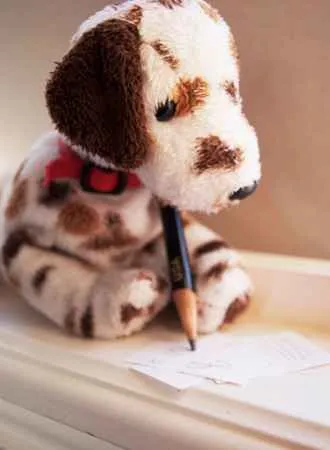
Adults Carry Stuffed Animals for Anxiety Relief
A growing number of adults are embracing the benefits of carrying stuffed animals for anxiety relief. It’s not uncommon to see adults with stuffed toys on their work desks or in their cars.
Carrying a stuffed animal can help adults express emotions, reduce stress, and cope with anxiety in a new environment. It’s a way to reconnect with the innocence and security of childhood, allowing them to both feel happy and more at ease in their daily lives.
Weighted Blankets and Their Therapeutic Benefits
Weighted blankets have gained popularity in recent years for their calming effects, helping those who struggle with anxiety, insomnia, and sensory issues.
Typically a weighted blanket is filled with glass beads or plastic pellets, these blankets provide gentle pressure, similar to a hug, which helps to release the stress hormone cortisol and promote the production of oxytocin, the “love hormone.”
This comforting sensation can help people fall asleep more easily and sleep more soundly throughout the night.
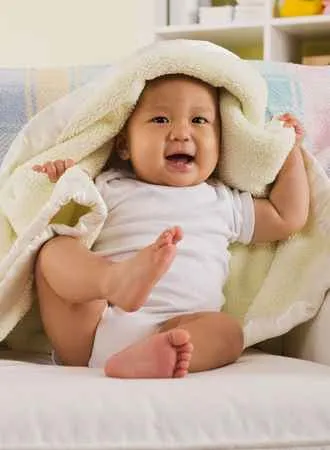
Teddy Bears: The Classic Comfort Companion
Teddy bears have been a staple comfort object for children and adults alike for generations. These adorable, huggable plush toys provide a sense of familiarity and unconditional support, making them the perfect companion for those struggling with anxiety or seeking emotional comfort.
Many adults who have held onto their childhood teddy bear find that they continue to provide solace during times of stress or loneliness even adults.
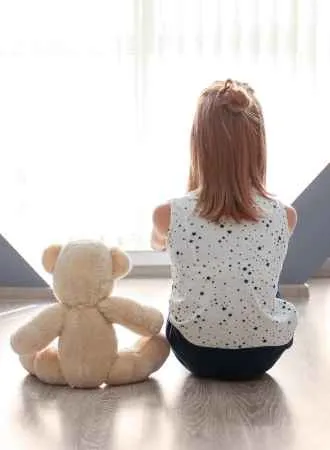
Best Stuffed Animals for Anxiety Relief
When searching for the best stuffed animals to help with anxiety, it’s essential to consider factors such as size, weight, material, and design.
Some top choices for anxiety relief include weighted stuffed animals, stuffed horses and dogs, and other plush toys infused with a lavender scent. These furry friends are specifically designed to calm the nervous system, promote relaxation, and ease loneliness.
Stuffed Animals Help Improve Mental Health
Beyond providing a sense of comfort and security, stuffed animals can also play a role aid therapy and in improving mental health. Incorporating stuffed animals into therapy sessions can be a valuable therapeutic tool, especially for those dealing with social anxiety, self-esteem issues, or memory loss. S
tuffed animals can serve as a non-judgmental listener, allowing individuals to express their feelings and thoughts openly. Additionally, they can serve as a grounding object during mindfulness exercises, helping to center and calm the individual.
Safety Standards and Quality Assurance
When choosing a stuffed animal for anxiety relief, it’s crucial to consider safety standards and quality assurance.
Look for plush toys made from high-quality materials and adhering to strict safety guidelines to ensure the toy is free from harmful chemicals or choking hazards.
Always follow the manufacturer’s care instructions to maintain the longevity and effectiveness of your stuffed animal.
Customizable Stuffed Animals
For those who want to create a truly personalized anxiety-relief companion, customizable stuffed animals are a great option.
Many companies allow customers to choose the size, weight, and even the scent of their stuffed animal.
Some even offer the option to include a personalized message or name, making the plush toy a unique and comforting presence in times of stress.
Stuffed Animals in Public Spaces
The growing acceptance of stuffed animals in public spaces, such as offices or schools, is helping to normalize the use of these comforting objects for anxiety relief among adults.
Workplaces are increasingly adopting policies that promote mental well-being, recognizing that stuffed animals and other comfort objects can contribute to a healthier, more productive environment.
Schools, too, are acknowledging the role of stuffed animals in helping students manage stress and anxiety, often allowing them in classrooms or designated relaxation areas.
Alternative Comfort Objects
While stuffed animals can be incredibly effective for many people, they might not be suitable or appealing for everyone. There are plenty of alternative comfort objects that can help reduce anxiety, such as:
- Worry stones: Smooth, polished stones that can be rubbed between the fingers to provide a soothing, tactile experience.
- Fidget spinners: Small, handheld devices that can be spun to help release nervous energy and improve focus.
- Sensory toys: Toys designed to engage the senses through various textures, shapes, and colors, helping to redirect anxious thoughts and provide a grounding effect.
By exploring these alternatives, individuals can find the comfort object that best suits their needs and preferences, ensuring they have a reliable tool for anxiety relief.

FAQs on Do Stuffed Animals Help With Anxiety
Do stuffed animals help with anxiety?
Yes, stuffed animals can help with anxiety by providing a sense of comfort and security. They can also activate the release of oxytocin, the “love hormone,” which can improve mood and induce feelings of relaxation and security.
The tactile sensation of holding a stuffed animal can help ground individuals in the present moment, allowing them to focus on the sensory experience rather than on their worries.
Do weighted stuffed animals help with anxiety in adults?
Weighted stuffed animals can be particularly helpful for adults dealing with anxiety. The added weight provides gentle sensory stimulation, similar to the effects of a hug, which can help calm the nervous system and relieve anxiety.
Weighted stuffed animals not only offer a greater sense of comfort and security compared to regular plush toys, but they also combine the benefits of traditional stuffed animals with those of weighted blankets.
Why is holding a stuffed animal comforting?
Holding a stuffed animal is comforting because it provides a sense of familiarity and reassurance. The soft, plush texture can be soothing to the touch, while the act of cuddling or hugging a stuffed animal can release oxytocin, a hormone that promotes feelings of relaxation and well-being.
Stuffed animals can also evoke feelings of warmth and comfort from childhood, helping to create a sense of safety and security.
What are the best weighted stuffed animals for anxiety?
The best weighted stuffed animals for anxiety are those that are the right size and weight for the individual, made from soft, high-quality materials, and designed to be comforting and appealing.
Some top choices include weighted stuffed animals infused with a calming scent like lavender or those that come in familiar and endearing designs. It is important to choose a weighted stuffed animal that resonates with you personally and meets your specific needs.
Can stuffed animals be a coping mechanism?
Yes, stuffed animals can serve as a healthy coping mechanism for individuals dealing with anxiety, stress, and other emotional challenges.
They provide a tangible source of comfort and security, helping to ground the person in the present moment and alleviate anxious thoughts. Stuffed animals can also be a non-judgmental listener, allowing individuals to express their negative feelings and thoughts openly.
Do stuffed animals help with mental health?
Stuffed animals can play a role in improving mental health by providing a sense of comfort, security, and emotional support. They can be particularly helpful for individuals dealing with social anxiety, self-esteem issues, or memory loss.
In therapy sessions, stuffed animals can serve as a grounding object during mindfulness exercises, helping to center and calm the individual. They can also be used as a tool to help individuals express their emotions and process their thoughts.
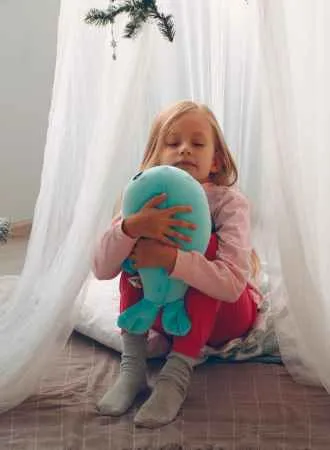
Why do I get emotional over stuffed animals or a stuffed toy?
Feeling emotional over stuffed animals is quite common and can be attributed to the strong emotional connections that people form with these comforting objects. Stuffed animals often represent a sense of security, warmth, and nostalgia, reminding us of the innocence and safety of childhood.
They can also evoke feelings of empathy and attachment, especially when the stuffed animal has been a source of comfort during difficult times. This emotional connection is one of the reasons why stuffed animals can be so effective in helping to alleviate anxiety and promote emotional well-being.
How do I choose a stuffed animal for someone else dealing with anxiety?
When choosing a stuffed animal for someone else dealing with anxiety, consider factors such as their personal preferences, size, material, and design. You may want to choose a character or animal or one with a cute face that you know the person is fond of or that has special meaning to them.
Opt for medium-sized plush toys made from soft, high-quality materials that are gentle on the skin. You can also consider selecting a weighted stuffed animal for added therapeutic benefits.
Can using a stuffed animal have any negative effects on anxiety or mental health?
While stuffed animals can be a helpful tool for managing anxiety and promoting mental health, relying too heavily on them could potentially have some negative effects.
For example, if an individual becomes overly dependent on their stuffed animal for emotional support, they may struggle to develop other coping mechanisms or seek help from friends, family, or mental health professionals.
It’s important to strike a balance between using a stuffed animal as a comforting tool and developing a range of healthy coping strategies to deal with anxiety and stress.

